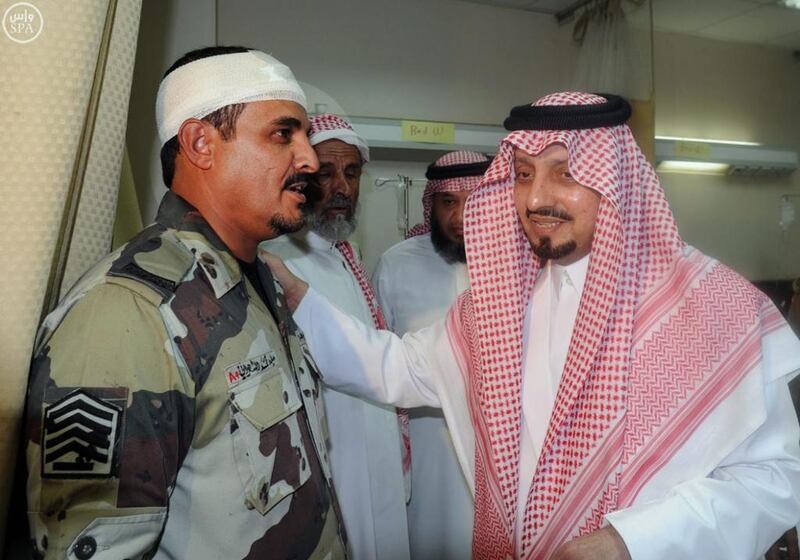ABU DHABI // Saudi Arabia is still determining the identity of the suicide bomber who killed at least 15 people in an attack on a mosque in the southwestern Asir province, an interior ministry spokesperson said on Friday.
“We are investigating the incident, and waiting for the forensic lab results” to identify the suspect, said Major General Mansour Al Turki.
A new ISIL affiliate called the Hijaz province claimed responsibility hours after the bombing took place on Thursday. But Gen Al Turki said the government would wait “until we have the results of our investigation” before determining if ISIL was to blame.
Twelve security officers with the Special Emergencies Services and three interior ministry employees were killed. Nine people were also wounded in the attack, which occurred in a mosque in an interior ministry compound in Abha, the capital of Saudi Arabia’s Asir province near the border with Yemen.
The suicide bomber was either a cadet or an interior ministry worker, according to a report in Al Hayat. The bombing took place after a group of officers had completed training for the week and had stopped for midday prayer at the mosque, according to a local report.
Last year, along with several other Arab states, Saudi Arabia joined a US-led coalition that is bombing ISIL in northern Syria and Iraq. Saudi Arabia is deeply concerned about the rise of the militant group across the region, especially because large numbers of its citizens have gone to fight in Syria and Iraq and there is a risk they could return and carry out attacks.
Thursday’s bombing was only the latest to hit Saudi Arabia in recent months. On July 16, a car bombing near a prison in Riyadh killed the attacker and wounded two policemen.
On May 22, a suicide bomber killed 21 people during prayers at a Shiite mosque in Qatif, a district of Saudi Arabia’s Eastern Province. On May 29, four people were killed in another suicide attack on a Shiite mosque in the port city of Dammam, also in the Eastern Province.
ISIL claimed responsibility for the attacks, along with a June 26 bombing of a Shiite mosque in Kuwait City that killed 27 people and wounded hundreds.
Those attacks were claimed by an ISIL affiliate called the Najd province. The Hijaz province, which claimed Thursday’s attack, is the newest branch of the group to declare itself. Along with its presence in Syria and Iraq, ISIL also has affiliates in Libya and Egypt’s Sinai Peninsula.
Last month, Saudi Arabia said more than 400 ISIL suspects had been detained in raids across the country. The suspects had been planning attacks on diplomatic missions, Shiite mosques and the security forces. “Saudi Arabia has been a principal target for ISIS, and the kingdom views the group’s sophisticated terrorist planning and recruitment strategies as a mounting challenge,” said Lori Plotkin Boghardt, an expert on Arabian Gulf states at the Washington Institute think tank.
jvela@thenational.ae





